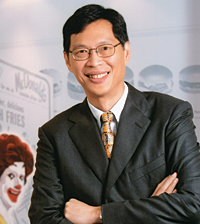| |
 |
| |
Peter
Tan '83 |
| |
|
Lifelong
bonds keep Peter Tan connected to Kellogg
by
Matt Golosinski
Peter
Tan carries around with him a poem that helps recall his responsibilities
as a leader — something he thinks about a lot, which
is good, since as president and CEO of McDonald's Greater
China he manages more than 75,000 people.
The poem
reads, in part: "...to find the best in others...to leave
the world a bit better...to know that one life has breathed
easier because you lived."
The affable
Kellogg School alum says he considers leadership "perhaps
the most important and least appreciated" discipline that
demands organizations' attention. And one way he helps disseminate
cutting-edge insights in this area is by supporting Kellogg.
Tan is
active on the Kellogg Alumni Advisory Board, has volunteered
as a Reunion keynote speaker, made significant financial contributions
and earned a 2004 Schaffner Award from the school for his
overall commitment to advancing the Kellogg mission.
"All of
us should spend part of our lives making it better for others,"
says Tan.
"I didn't
realize it at first, but my Kellogg experience has had such
a powerful impact on me that it's almost life transforming.
So there is a moral obligation to leverage this wonderful
opportunity I enjoyed and give back to others, including Kellogg
itself."
The 1983
graduate credits Kellogg with providing the management tools
to enable him to move from "B to B — banking to burgers."
Tan left Citibank in 1993 for McDonald's because, although
he enjoyed banking, he wanted more opportunity to work with
people and make a positive difference in their lives. Tan
says his successful transition "testifies to what a well-balanced
program Kellogg offers."
But beyond
providing the practical skills to change careers, Kellogg
gave Tan something even more profound, he says. "Kellogg helped
me become more confident, creative, inquisitive and strong-willed.
That's when I knew I really had to do something for the school."
Indeed,
Tan feels strongly that he and his alumni peers must do all
they can to support Kellogg — support that he says has
not always been demonstrated as widely or deeply in the school's
alumni community as it should be.
"Every
Kellogg alum has a vested interest in protecting their own
investment in the school," states Tan, who considers the tuition
he paid for his education analogous merely to the greens fees
in golf. But to keep playing the game, he says, you have to
give more.
"We have
to work to maintain Kellogg," says Tan. "You wouldn't buy
a car, for instance, and forget about maintaining it. How
do you even put an amount on the value of a Kellogg education
that gives you a foot in the door for the rest of your life?"
For Tan,
Kellogg provided a framework that enabled him to rise to a
senior leadership position. In particular, the school's culture
and emphasis on teamwork has proven valuable in how he approaches
his job.
"Business
success is about managing people. McDonald's is not a hamburger
business, but, ultimately, a people business," he says, adding
that the company's international ventures have done well,
in part, because they have simultaneously functioned as local
firms while retaining their transnational brand identity.
Kellogg excels not only in delivering the core competencies
every manager needs to succeed, notes Tan, but also in imparting
an ability to manage people.
Over time,
he has conceptualized several values that have informed his
success, both professionally and personally. Among these he
cites the importance of establishing "an emotional trust bank"
within an organization that enables people to feel secure
and respected. Without this trust, he says, employees won't
do their best work. Other values include caring about your
people ("true leaders almost never talk about themselves")
while cultivating "ferocious passion" and "undaunted curiosity."
"You cannot
build a great company if you are not passionate about the
brand and products, or if you wake up each morning dreading
the fact that your picture hasn't yet appeared among the obituary
pages of your daily paper," says Tan.
For those
who see more of themselves reflected in this description than
they would like to admit, Tan advises lifelong learning as
a way to rejuvenate.
Fortunately,
Kellogg alums don't have to look far for such inspiration,
says Tan, who recalls his MBA experience as "unique" because
of the "connectedness" between the faculty and students.
And despite
graduating more than 20 years ago, Tan still relishes returning
to Evanston. "It's like coming home when I'm here," he says.
"Kellogg has been almost family for me because of the camaraderie
and bonds I've built through participation with the school."
Continue
to Bob Eckert '77
Back
to Why alumni give back
|



